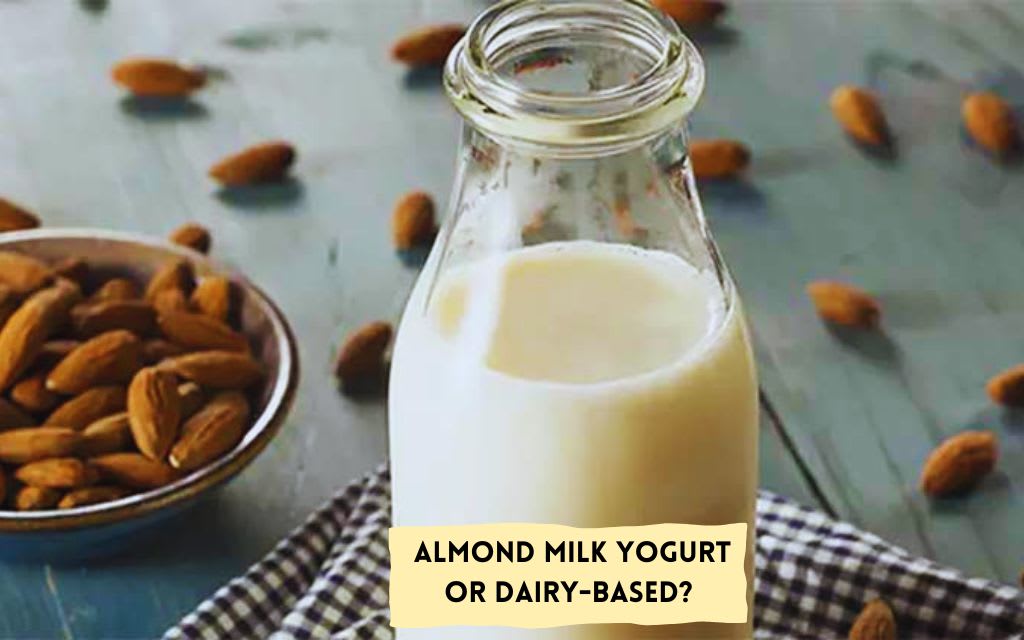Almond Milk Yogurt or Dairy-Based? Here's Which One is Better for You
"Almond Milk Yogurt vs. Dairy-Based Yogurt: Comparing Nutritional Benefits, Dietary Suitability, and Environmental Impact"

In the quest for healthier and more sustainable dietary choices, many individuals are opting for plant-based alternatives to traditional dairy products. When it comes to yogurt, almond milk yogurt has emerged as a popular dairy-free option. But how does it compare to its dairy-based counterpart? In this article, we'll explore the nutritional benefits, environmental impact, and potential drawbacks of almond milk yogurt and dairy-based yogurt, helping you make an informed decision about which one is better suited for your needs.
Nutritional Benefits: Almond Milk Yogurt
Almond milk yogurt is made by fermenting almond milk with probiotic cultures, similar to the process used to make dairy-based yogurt. One of the key advantages of almond milk yogurt is its lower calorie content compared to dairy-based yogurt. This can be beneficial for individuals who are watching their caloric intake or aiming to lose weight. Additionally, almond milk yogurt is naturally cholesterol-free and low in saturated fat, making it a heart-healthy choice.
Almonds themselves are nutrient-dense, providing essential vitamins and minerals. When transformed into yogurt, these nutrients become even more bioavailable, enhancing their absorption and utilization by the body. Almond milk yogurt is a rich source of vitamin E, an antioxidant that supports immune function and promotes healthy skin. It also contains magnesium, calcium, and potassium, which are essential for bone health, muscle function, and overall well-being.
Moreover, almond milk yogurt is suitable for individuals with lactose intolerance or milk allergies. Lactose, a sugar found in milk, can cause digestive discomfort and other adverse reactions in those who lack the enzyme necessary to digest it. Almond milk yogurt offers a dairy-free alternative that can be enjoyed without these side effects. It provides a creamy and flavorful option for individuals seeking a plant-based alternative to meet their yogurt cravings.
Nutritional Benefits: Dairy-Based Yogurt
On the other hand, dairy-based yogurt offers its own set of nutritional benefits. It is an excellent source of high-quality protein, which plays a crucial role in muscle development, tissue repair, and overall growth. Dairy-based yogurt also contains calcium, which is essential for strong bones and teeth. It provides a good amount of B vitamins, such as riboflavin and vitamin B12, as well as minerals like phosphorus and zinc.
Another advantage of dairy-based yogurt is its probiotic content. Probiotics are beneficial bacteria that support gut health and promote a balanced digestive system. They can improve digestion, enhance nutrient absorption, and boost immune function. While almond milk yogurt also contains probiotics, dairy-based yogurt may offer a wider variety of bacterial strains that are specific to dairy fermentation.
Environmental Impact: Almond Milk Yogurt
When it comes to sustainability, almond milk yogurt has a lower environmental impact compared to dairy-based yogurt. Dairy production requires large amounts of water, land, and feed for cattle, contributing to deforestation, water pollution, and greenhouse gas emissions. Almond milk, the base ingredient for almond milk yogurt, requires significantly less water and land to produce, making it a more sustainable choice. Almonds are also a drought-tolerant crop, which further reduces their environmental footprint.
Potential Drawbacks: Almond Milk Yogurt and Dairy-Based Yogurt
While both almond milk yogurt and dairy-based yogurt offer numerous benefits, there are a few potential drawbacks to consider. Almond milk yogurt may not be suitable for individuals with nut allergies, as almonds are a tree nut. It is important to read labels carefully and ensure there is no cross-contamination with other allergens.
Dairy-based yogurt, on the other hand, may be unsuitable for those who are lactose intolerant or have dairy allergies. Additionally, some individuals may experience digestive issues or inflammation when consuming
dairy-based yogurt due to lactose intolerance, lactose sensitivity, or dairy protein allergies. It's essential to listen to your body and consult with a healthcare professional if you have any concerns or underlying conditions.
When choosing between almond milk yogurt and dairy-based yogurt, personal preferences and dietary needs should also be taken into account. Taste and texture can vary significantly between the two options. Almond milk yogurt has a subtly nutty flavor and a smooth, creamy texture, while dairy-based yogurt has a tangy taste and a thicker consistency.
It's worth noting that the availability and variety of almond milk yogurt in the market have increased in recent years, offering consumers more options to choose from. Some brands fortify their almond milk yogurt with additional nutrients, such as vitamin D and calcium, to match the nutritional content of dairy-based yogurt more closely. Checking the ingredient list and nutritional information on the packaging can help you select a product that aligns with your dietary goals.
Ultimately, the decision between almond milk yogurt and dairy-based yogurt depends on various factors, including personal taste preferences, dietary restrictions or allergies, nutritional goals, and environmental considerations. Both options have their unique advantages and can be part of a healthy and balanced diet.
If you prefer a dairy-free, plant-based option that is lower in calories, cholesterol-free, and suitable for lactose-intolerant individuals, almond milk yogurt is an excellent choice. Its nutrient profile, including vitamin E, magnesium, and calcium, can contribute to overall health and well-being.
However, if you have no dietary restrictions or allergies, and you enjoy the taste and texture of dairy-based yogurt, it can be a valuable source of high-quality protein, calcium, and other essential nutrients. The probiotics in dairy-based yogurt can support digestive health and immune function.
Ultimately, it's essential to listen to your body, consider your individual needs and preferences, and make a decision that aligns with your overall health and well-being. Whether you choose almond milk yogurt or dairy-based yogurt, incorporating a variety of nutrient-dense foods into your diet is key to maintaining a balanced and healthy lifestyle.
When it comes to incorporating almond milk yogurt or dairy-based yogurt into your diet, there are a few practical considerations to keep in mind. One is the availability and accessibility of the products in your area. While dairy-based yogurt is widely available in most grocery stores, almond milk yogurt may be more limited in options. However, with the increasing popularity of plant-based alternatives, almond milk yogurt can often be found in health food stores or specialty sections of supermarkets.
Another aspect to consider is cost. Generally, almond milk yogurt tends to be slightly more expensive than dairy-based yogurt. This price difference can vary depending on brand, quality, and region. It's important to evaluate your budget and determine what you are willing to spend on yogurt while still prioritizing your nutritional needs.
Lastly, it's worth mentioning that both almond milk yogurt and dairy-based yogurt can be used in a wide range of recipes and dishes. They can be enjoyed on their own, mixed with fruits and granola for a healthy breakfast or snack, or used as a versatile ingredient in smoothies, desserts, and savory recipes. The choice between almond milk yogurt and dairy-based yogurt should not limit your culinary creativity and enjoyment.
In conclusion, the decision between almond milk yogurt and dairy-based yogurt ultimately depends on your individual preferences, dietary restrictions or allergies, nutritional goals, and environmental concerns. Almond milk yogurt offers a dairy-free, lower calorie, and cholesterol-free alternative that is suitable for lactose-intolerant individuals and those following a plant-based lifestyle. On the other hand, dairy-based yogurt provides a rich source of protein, calcium, and other essential nutrients, along with a wide variety of bacterial strains that support gut health.
Consider your own needs and priorities, experiment with different options, and listen to your body's response. You may find that one type of yogurt better suits your taste buds, dietary requirements, and overall well-being. Ultimately, both almond milk yogurt and dairy-based yogurt can be part of a healthy and balanced diet when chosen mindfully and enjoyed in moderation.
References:
About the Creator
Abdul Jamil Nasir
Unlock the World's Insights: Join Abdul Jamil Nasir Share as he brings you the most captivating & trending information from every corner of the globe. With Abdul Jamil's unparalleled coverage & exclusive stories, stay ahead of the curve.
Enjoyed the story? Support the Creator.
Subscribe for free to receive all their stories in your feed. You could also pledge your support or give them a one-off tip, letting them know you appreciate their work.






Comments
There are no comments for this story
Be the first to respond and start the conversation.